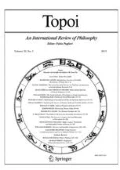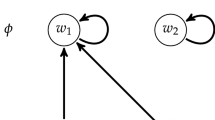Abstract
Famously, Frank P. Ramsey suggested a test for the acceptability of conditionals. Recently, David Chalmers and Alan Hájek (2007) have criticized a qualitative variant of the Ramsey test for indicative conditionals. In this paper we argue for the following three claims: (i) Chalmers and Hájek are right that the variant of the Ramsey test that they attack is not the correct way of spelling out an acceptability test for indicative conditionals. But there is a suppositional variant of the Ramsey test which is still stated in purely qualitative terms, which avoids the problems, and which looks correct. (ii) While the variant of the Ramsey test that Chalmers and Hájek criticize is not correct, it is still a good approximation of a correct formulation of the Ramsey test which may be usefully employed in various contexts. (iii) The variant of the Ramsey test that Chalmers and Hájek suggest as a substitute for the deficient version of the Ramsey test is itself subject to worries similar to those raised by Chalmers and Hájek, if it is given a non-suppositional interpretation.
Similar content being viewed by others
Notes
Although they also seem to think that what Ramsey says about this himself in his paper is right.
In personal communication, however, they did inform me that they had not meant their footnote 1 to be understood in this way.
By this I do not mean to suggest that Chalmers and Hájek understood (R’) in non-suppositional terms themselves.
A similar point is made by Barnett (2008).
Other than applications of such rules to statements that are available to the agent even outside of the context of supposition—but the results of such applications could then be counted as belonging to the statements \(r_1, r_2, r_3, \hdots\) that we have dealt with already.
Necessitation is valid only in the sense that if \(\vdash A\) then \(\vdash \square A\) but not in the sense that \(A \vdash \square A\) . What is called called ‘logical validity’ in doxastic logic maybe should be called really ‘pragmatic validity’, but that is not how doxastic logicians talk.
Actually, the important point is to restrict the consequent proposition that is substituted for ‘p’ in this way, but in order to simplify things a bit we restrict both the antecedent and consequent propositions as such.
A more successful—and more severe—restriction would be to such and only cases in which the acceptance of the antecedent of an indicative conditional is both evidentially and causally independent of the state of affairs that is described by the consequent of the conditional.
For those who are interested in suppositional theories of counterfactuals and in the differences between evidential and causal decision theory: the relevant kind of supposition here is matter-of-fact supposition, not counter-to-the-facts supposition (see Joyce 1999). This is a reflection of the fact that we are only concerned with the acceptance of indicative conditionals in this paper.
There are other reflection principles which, if combined with the standard ratio formula for conditional probabilities, would lead to trouble again: e.g., if pr(q) = r then pr(pr(q) = r) = 1. This would have the consequence that all indicative conditionals of the form ‘If p then pr(q) = r’, where pr(q) is in fact r, are acceptable to the agent in question, and all indicative conditionals of the form ‘If p then pr(q) = s’ in the same type of situation, but where now the number denoted by ‘s’ is distinct from the number that is denoted by ‘r’ above, are inacceptable. This would be so independently of what p is like (except that pr(p) has to be greater than 0). In particular, also ‘If p then pr(p) = r’ would be acceptable and ‘If p then pr(p) = s’ would be inacceptable, subject to same constraints on r and s again.
This said, in personal communication, Chalmers and Hájek pointed out that they did mean to understand conditional probability in suppositional terms when they wrote their footnote 1. Additionally, Alan Hájek informed me that, independently, he had a thought very similar to III. of this paper, and that he is going to make that point in a publication of his that he is preparing.
It do not mean to suggest that Chalmers and Hájek themselves understood their paper as an argument for preferring a quantitative analysis of the Ramsey test over a qualitative one—in fact they do not, as they made clear in personal communication. But it is certainly tempting to (mis-)interpret their paper in this way.
References
Barnett D (2008) Ramsey + Moore ≠ God. Analysis 68:168–74
Chalmers D, Hájek A (2007) Ramsey + Moore = God. Analysis 67:170–72
Joyce J (1999) The foundations of causal decision theory. Cambridge University Press, Cambridge
Ramsey FP (1931) General propositions and causality. In: Braithwaite RB (eds) The foundations of mathematics and other logical essays. Kegan Paul, London
Acknowledgments
I would like to thank David Chalmers and Alan Hájek for a very helpful and stimulating discussion on an early version of this paper. I would also like to thank the Leverhulme Trust for their support of my research.
Author information
Authors and Affiliations
Corresponding author
Rights and permissions
About this article
Cite this article
Leitgeb, H. God − Moore = Ramsey (A Reply to Chalmers and Hájek). Topoi 30, 47–51 (2011). https://doi.org/10.1007/s11245-010-9088-x
Published:
Issue Date:
DOI: https://doi.org/10.1007/s11245-010-9088-x




